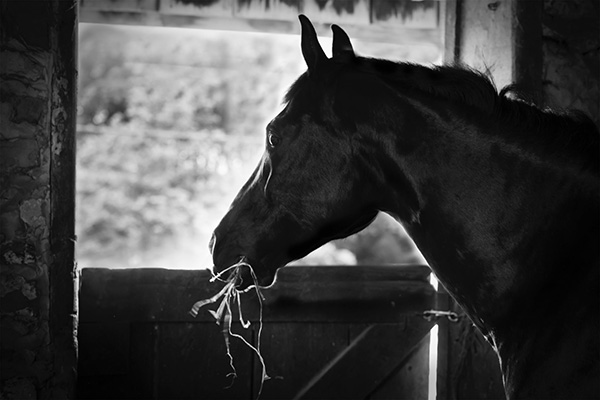Don’t Let Dust Diminish Your Horse

Every effort should be should be taken to minimize dust to help prevent irreversible breathing issues. Photo: Roberto Quezada-Dardon (Unsplash)
Story by: Jackie Bellamy-Zions, Equine Guelph
Have you ever walked in a barn, and felt like your lungs were being assaulted? Imagine how a horse feels, particularly if they spend hours in a stall. When horses exercise, they take on upwards of 16 times as much air per second than their human owners. Their lung capacity is enormous, as are their athletic capabilities, unless they are compromised by environmental factors. Much can be done from a management standpoint to minimize dust and harmful particulates in a horse’s environment while maximizing athletic function and general comfort in the process.
Even a horse not exhibiting signs of breathing issues may be under assault from airborne particles. Every effort should be taken to minimize dust to practice prevention of irreversible breathing issues.
The Culprits We Can Control
- Round bales are not recommended. Horses that spend their day buried neck deep in a round bale are inhaling a copious number of irritants.
- Hay and bedding are two of the top sources of mold and particulate in a horse’s environment
- Consider wetting or steaming hay prior to feeding or hay alternatives if the horse is triggered by the hay in its diet. Research has been conducted on steamed hay vs soaked and the variable nutrient losses to consider, so be sure to discuss this option with your vet and nutritionist.
- Consider wood shavings over straw.
- Ventilation is a primary concern when building a barn but many stables are lacking. Ensure you have good airflow through your stable and periodically remove the cobwebs as you clean your barn.
- Horses take in 64-70 litres of air per second when exercising. Footing in the arena needs to be regularly maintained to keep dust from rising into that air.
- Do not sweep dust and debris from the barn aisle into your horse’s stall, in fact, don’t sweep at all when horses are in the barn. Wet down the floor before you begin and wear a mask for your own respiratory health.
- Keep horses outside as much as possible, unless medical conditions require stalling.
Have a look at Equine Guelph’s Defend Against Dust fact sheet.
Also check out this awesome infographic shared by our sponsor, Boehringer Ingelheim.
Signs of Equine Asthma
- cough
- nasal secretions from mucous production
- exercise intolerance
- difficulty expelling air
- heave line
- inflammation of lung epithelium and narrowing of Bronchus (can be confirmed by a BAL Bronchoalveolar lavage)
Dr. Dorothee Bienzle illustrates signs of heaves/asthma in this video.
Why Practice Diligent Prevention?
Irreversible damage can be done by the cumulative effect from years of exposure to dust, mold and other particulate matter.
If a horse is coughing and asthma is suspected, the veterinarian will be looking closely at the horse’s environment to determine what is causing the irritation in the lungs. They will be looking at all potential causes which could include: dusty environments, smoke inhalation, pollen or other allergens and particles in the pasture or hay.
Don’t wait for your horse to start coughing to practice prevention. If your horse begins to cough, call the vet right away to investigate the cause. When dealing with respiratory ailments early diagnostics, aggressive treatment and environmental management are of paramount importance.
Articles of interest:
OVC Researcher Contributes to Global Paper on Equine Asthma
Coughing? The Time to Take Action is Now
Learn more about maintaining a healthy environment for your horse with the next online offering of Equine Guelph’s Management of the Equine Environment course.










